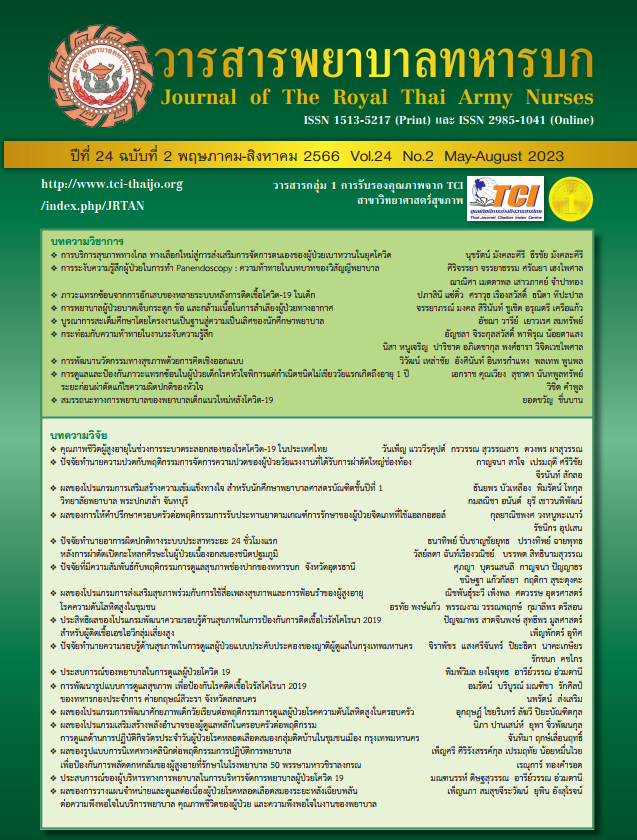The Effect of Family Counseling on Medication Adherence of Schizophrenic Patients with Alcohol Use
Keywords:
Family counseling, Medication adherence, Schizophrenic patients with alcohol useAbstract
A quasi-experimental research which was conducted with a pre- and post-experimental measurement. The aims of the study included: 1) to compare behaviors ofschizophrenic patients with alcohol usage in medication adherence between pre and post receiving a family counseling program; and 2) to compare behaviors ofschizophrenic patients with alcohol usage in medication adherence for repeated measurements after 1 week and 1 month. The sample group was qualified schizophrenic patients with alcohol usage treated in outpatient department at Nangrong Hospital. The patients were randomly matched with those who had similar qualifications as 20 pairs of patient and family member as a caregiver. The experimental group received four weeks of family counseling program in medication adherence. As for the research instruments, there were 1) Family Counseling Program; 2) Medication Adherence scale; 3) Brief Psychiatric Rating Scale :BPRS and 4) The Obsessive Compulsive Drinking Scale: OCDS. All instruments were tested for content validity by 5 experts with Cronbach’s alpha coefficients of .80, .86 and .94 respectively. Data analysis use One-way Repeated Measure ANOVA. The results of the research could be summarized as follows. The medication adherence of schizophrenic patients with alcohol usage followed up after 1 week and 1 month was higher than after receiving family counseling, which was accounted of .05 statistically significant.
Downloads
References
Department Mental Health. Schizophrenia Care Guide for Hospitals in Health Areas (Medical Edition). Nonthaburi: Victoria; 2017. (in Thai)
Batki SL, Leontieva L, Dimmock JA, Ploutz-Snyder RJSr. Negative symptoms are associated with less alcohol use, craving, and “high” in alcohol dependent patients with schizophrenia. 2008;105(1-3):201-7.
McCann T, Boardman G, Clark E, Lu SJJoP, Nursing MH. Risk profiles for non-adherence to antipsychotic medications. 2008;15(8): 622-9.
Gilmer TP, Dolder CR, Lacro JP, Folsom DP, Lindamer L, Garcia P, et al. Adherence to treatment with antipsychotic medication and health care costs among Medicaid beneficiaries with schizophrenia. 2004; 161(4):692-9.
Gutiérrez-Maldonado J, Caqueo-Urízar A, Kavanagh DJJSp, epidemiology p. Burden of care and general health in families of patients with schizophrenia. 2005;40(11):899-904.
Department of Mental Health. Schizophrenia Care Guide for hospitals in the health district (Nurse Edition/Public Health Scholar); 2016. (in Thai)
Hou SY, Ke CLK, Su YC, Lung FW, Huang CJJP, neurosciences c. Exploring the burden of the primary family caregivers of schizophrenia patients in Taiwan. 2008;62(5):508-14.
Haynes RB, Yao X, Degani A, Kripalani S, Garg A, McDonald HP. Interventions to enhance medication adherence. Cochrane Database Syst Rev. 2005;(4):CD00011.
Salyers MP, Mueser KTJSr. Social functioning, psychopathology, and medication side effects in relation to substance use and abuse in schizophrenia. 2001;48(1):109-23.
Hegde S, Rao SL, Raguram A. Integrated Psychological Intervention for Schizophrenia; International Journal of Psychosocial Rehabilitation; 2007;11 (2), 5-18.
Pandang P. The Effect Of Patient and Caregiver Empowerment on Medication Behaviors Of Schizophrenic. (thesis). Bangkok: Chulalongkorn University; 2004. (in Thai)
Novick D, Haro JM, Suarez D, Perez V, Dittmann RW, Haddad PMJPr. Predictors and clinical consequences of non-adherence with antipsychotic medication in the outpatient treatment of schizophrenia 2010;176(2-3): 109-13.
Drake RE, Mueser KTJAr, health. Co-occurring alcohol use disorder and schizophrenia. 2002;26(2):99.
Barry J. Counseling Skills Training Manual. Chulalongkorn University; 1995. (in Thai)
Trangkasombat U. Family therapy and Family Counseling. Fuengfah; 2001. (in Thai)
Farragher BJImj. Treatment compliance in the mental health service. 1999.
Organization WH. The ICD-10 classification of mental and behavioural disorders: clinical descriptions and diagnostic guidelines: World Health Organization; 1992.
Burns NA, Grove SK. Study guide for the practice of nursing research: conduct, critique, and utilization: WB Saunders Company; 2005.
Cheawsothon S. The Effects of Empowerment in Schizophrenia Patients to behavior Use of medication according to medication adherence. (thesis). Bangkok: Chulalongkorn University; 2002. (in Thai)
Suktrakul S. The effect of alcohol craving control program on alcohol consumption in alcohol dependents: Chulalongkorn University; 2009. (in Thai)
Overall JE, Gorham DRJPr. The brief psychiatric rating scale. 1962;10(3):799-812.
Kittiratanapaiboon p. Interview form for Psychiatric diagnosis. Academic Psychiatry and Psychology Journal, 2003;19(1):18-9. (in Thai)
Chaleoykitti S, Wongpanarak N. Family Therapy: Counseling and Empowerment of positive thinking in family. Journal of The Royal Thai Army Nurses; 2015;16(1):14-21. (in Thai)
Stithyudhakarn S. Recurrence in patients with chronic schizophrenia: Situation and preventive measures. Journal of Nursing Science, Chulalongkorn University; 2016, 28(3): 1-15. (in Thai)
Downloads
Published
How to Cite
Issue
Section
License
Copyright (c) 2023 Journal of The Royal Thai Army Nurses

This work is licensed under a Creative Commons Attribution-NonCommercial-NoDerivatives 4.0 International License.
บทความหรือข้อคิดเห็นใดใดที่ปรากฏในวารสารพยาบาลทหารบกเป็นวรรณกรรมของผู้เขียน ซึ่งบรรณาธิการหรือสมาคมพยาบาลทหารบก ไม่จำเป็นต้องเห็นด้วย
บทความที่ได้รับการตีพิมพ์เป็นลิขสิทธิ์ของวารสารพยาบาลทหารบก
The ideas and opinions expressed in the Journal of The Royal Thai Army Nurses are those of the authors and not necessarily those
of the editor or Royal Thai Army Nurses Association.






